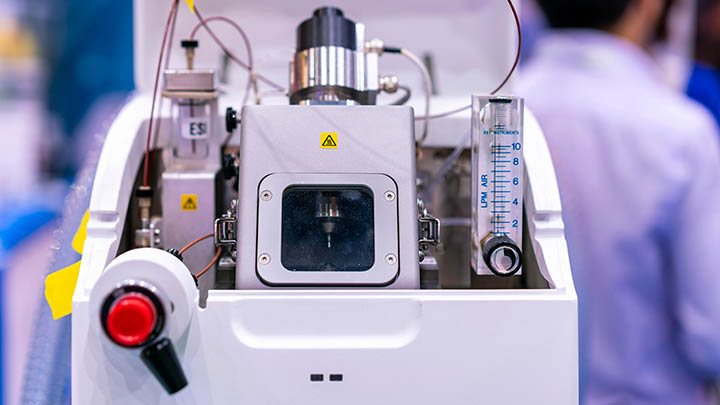Combining research training and teaching skills
A unique option for international students
Our four-year programme offers a Doctor of Philosophy (PhD) in biological, medical or health sciences with a built-in accredited teaching certificate.
Developed for international students, this programme will see you carry out independent research while gaining a Postgraduate Certificate in Medical and Health Education, and specialist training across a range of biological, medical and health sciences.
Why choose this programme?
- Undertake a PhD project in an internationally recognised research environment.
- Develop your teaching skills and gain a postgraduate certificate in higher education.
- Enhance your critical thinking and research skills through taught courses.
- Access support to develop your academic writing.
- Broaden your research techniques and gain transferable skills.
- Take courses in research methods in discipline-related topics.
- Learn in an interdisciplinary research environment.
- Gain a competitive edge for a career in higher education.
Our programme
How it works
This programme ensures our international doctoral graduates become future leaders in academia or their chosen career in biological, medical, or health sciences.
Check our programme structure below for a list of what you will study each year, and also explore the four components which make up the programme.
A year-by-year guide to the PhD programme with integrated teaching certificate.
Year 1
- Research literature review (October-February)
- Research and data collection (throughout the year)
- Continuation report unit (due July)
- Taught master's units, including Research Methods and Research Skills workshops (October-February)
- Academic writing skills (October-January)
- Transferable skills (throughout the year)
Exit award: Master of Philosophy (MPhil) (if achieved satisfactory data collection)
Year 2
- Research data collection (throughout the year)
- One or two Postgraduate Certificate in Medical and Health Education units
- Academic writing skills (throughout the year)
- Transferable skills (throughout the year)
Year 3
- Research data collection and analysis (throughout the year)
- One or two Postgraduate Certificate in Medical and Health Education units (depending on how many were taken in Year 2)
- Academic writing skills (throughout the year)
- Transferable skills (throughout the year)
Year 4
- Research (October-April)
- Thesis writing up (April-September)
- Thesis submission (due end of September)
- Oral examination
Final award: PhD and PGCert Medical and Health Education
You will choose a self-funded research project specific to your area of study.
View a list of example projects below or search all self-funded projects.
Fees and entry requirements for the programme are dependent on your chosen research project. Please see individual project listings for details.
You will be expected to submit your PhD thesis within the writing up period of the programme.
If you do not find an ideal project, don't be discouraged. We encourage outstanding candidates to contact us directly regarding potential applications. You can either contact the academic you are interested in working with directly, or email for advice: admissions.doctoralacademy@manchester.ac.uk
Biological sciences
- Cell Matrix Biology
- Proteomic analyses of adhesion signalling in cancer - Prof Martin Humphries, Dr Claus Jorgensen
- Understanding and minimizing radiation damage in breast tissues - Dr Michael Sherratt, Prof Sarah Cartmell
- Evolution and Genomic Sciences
- The role of the spliceosome protein Prpf8 in embryonic development - Dr Kathy Hentges
- Understanding regulation of gene expression during development via an integrated computational analysis of ‘omics data - Prof Simon Hubbard, Prof Sam Griffiths-Jones, Dr Martin Baron
- Infection, Immunity and Respiratory Medicine
- The respiratory metagenome during exacerbations of asthma - Prof Nikos Papadopoulos, Prof David Robertson, Dr Spyridon Megremis
- Do altered host-microbial interactions promote oral inflammation during ageing? - Dr Joanne Konkel, Prof Andrew McBain
- Molecular and Cellular Function
- Regulatory roles for ribosome-associated proteins in protein synthesis - Prof Graham Pavitt, Dr Martin Pool
- Musculoskeletal and Dermatological Sciences
- An investigation of psychological and clinical factors associated with the development of chronic or persistent pain in children and young people with inflammatory and non-inflammatory musculoskeletal conditions - Dr Lis Cordingley, Prof Wendy Thomson, Dr Rebecca Lee, Dr Janet McDonagh
- Neuroscience and Experimental Psychology
- Tackling neurovascular dysfunction in dementia: a cell biology and biomaterials approach - Prof Nigel Hooper, Dr Marco Domingos, Dr Tao Wang
- Face identity recognition: Exploring the role of observer motion and motion of viewed person - Dr Karen Lander, Dr Paul Warren
Medical sciences
- Cancer Sciences
- Chemotherapy dose-capping due to obesity and its impact on survival - Prof Andrew Renehan, Dr Jorge Barriuso
- Developmental Biology and Medicine
- Understanding the impact of placental aging on placental function - Dr Alexander Heazell, Dr Mark Dilworth, Dr Michelle Desforges
Health sciences
- Human Communication, Development and Hearing
- The influence of agency and engagement with animals on conservation and welfare education in zoos - Dr Keith Jensen, Dr Susanne Shultz
- Pharmacy and Optometry
- Development of a three dimensional in vitro model of the human cornea to dissect the inflammatory events associated with sight-threatening ocular pathogens - Dr Curtis Dobson, Dr Carole Maldonado-Codina, Prof Philip Morgan
- In vitro assessment of drug sequestration into lysosomes and in silico prediction of implications for drug disposition and therapeutic efficacy - Dr Aleksandra Galetin, Dr David Halifax
- Psychology and Mental Health
- Exploring therapeutic alliance for digital mental health - Dr Katherine Berry, Dr Sandra Bucci
The programme allows you to study for a postgraduate certificate (PGCert) in teaching while conducting your research.
This qualification provides practical and theoretical skills in teaching and assessment in a variety of settings. It will give you a competitive edge if you are planning a career in higher education.
You will take three teaching certificate units as part of the programme:
The Reflective Educator (September)
- Study the theory that underpins effective practice in teaching, learning, assessment and evaluation
- Analyse your role as an educator and reflect on developments in your discipline
- Develop innovative approaches to learning opportunities, curriculum and learning tools
The Art and Science of Teaching (November)
- Understand the principles of curriculum design and course development
- Consider appropriate teaching to enhance learning
- Explore curriculum in terms of interprofessional education, leadership, mentoring and professionalism
Pass or Fail, Who Decides? (February)
- Explore current assessment practices within the context of your discipline
- Consider how assessment fits into the broader remit of evaluation and quality assurance
- Understand the impact and value of feedback
When you start the programme, you will take an online test to assess your writing support needs. The outcome of this will determine the level and nature of support during the programme.
You will then take an online course made up of 13 modules to help you improve your academic literacy. The course can be completed over a six-week period and this independent study will also help you to develop time management and organisational skills.
You can also get additional support through weekly face-to-face classes.
You can enhance your research and professional skills through our Doctoral Academy training programme. This support is tailored to your personal development and the needs of your project.
You will also be supported by a thriving research community that will promote collaboration and networking opportunities.
Doctoral Academy
You can enhance your research and professional skills through our Doctoral Academy training programme. This support is tailored to your personal development and the needs of your project.

Supportive environment
You will also be supported by a thriving research community that will promote collaboration and networking opportunities.

Student support
Join our community
Manchester is a city with a thriving international community and a history of transforming the world, and you can be a part of it!
As an international student you will benefit from an established support network. Once you arrive, there are plenty of social activities and peer support available through our friendly Doctoral Academy Graduate Society.
Learn more about being an international postgraduate researcher
What we do for our students
Supervision
Ensure you have a supervisory team that will provide the highest quality research expertise.

Postgraduate tutor
Assign you with a postgraduate tutor, who will monitor progression and provide independent guidance.

Monitoring your progress
Provide a dedicated system for monitoring your own progression and training.

Technology platforms
Provide state-of-the-art research expertise and equipment via our research facilities.

Offer holder information
Provide a dedicated offer holders' website containing essential pre-arrival information for registration and your induction week.

Making an application
Apply for the programme
We recommend you apply as early as possible to ensure you receive full support in selecting the right project/supervisor.
Applications process
Please follow the information and step-by-step guide on our main How to apply page. Specific details for this programme are noted below.
Projects
You must make one separate application for this programme (select 'PhD programme with integrated teaching certificate' on the online application form). If you select the incorrect programme, your application cannot be considered.
Decide on the project or supervisor that is most relevant to your research interests using the project search. For this programme, you can select self-funded projects or develop your own research proposal in partnership with potential supervisors. Applicants can select up to three projects on one single application, noting the title of each project from the advert and the supervisor name.
You may apply for up to two projects of interest on your application form. You may also wish to notify your prospective supervisor that it is the PhD programme with integrated teaching certificate in which you interested.
We ask that you make direct contact with preferred supervisors to discuss your application and the project in more detail, before submitting an application form.
Funding
For the funding sources section on the online application form, you will need to provide details of how you intend to fund your studies. It is important to give as much detail as possible about your known or expected funding arrangements.
If you have not secured or do not intend to apply for funding to cover the cost of your studies, you should select No. In this case, you do not need to provide any further details and we will assume that you are funding your studies yourself.
If you have other sources of funding, please indicate this here and include your scholarship letter, if you have one.
Other application information
You must submit your completed application for a postgraduate research programme before the relevant deadline to be considered.
You will not be able to apply after these deadlines have passed.
Application deadlines
- January entry: 15 October (previous year)
- April entry: 15 January
- September entry: 15 June
For entry to this PhD programme, we require a Bachelors (Hons) degree with a minimum Upper Second (or the overseas equivalent) in a relevant subject area.
See English language requirements on our main How to Apply page.
You will be kept informed of the progress of your application throughout the application procedure. If appropriate, you will be invited for an interview either in person or via Zoom.
Please note: If you are made an offer, you may need to apply for an ATAS certificate before applying for your visa. For more information see Academic Technology Approval Scheme (ATAS).
Contact us
Have any questions? Get in touch.
For more information about this programme, please email us.
